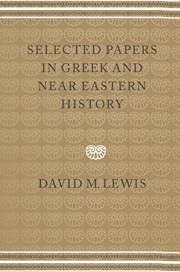Book contents
- Frontmatter
- Contents
- List of plates
- Preface
- Systems of reference
- GENERAL
- ATHENIAN
- 9 Public property in the city
- 10 Cleisthenes and Attica
- 11 Review of J. S. Traill, The Political Organization of Attica
- 12 Review of P. Siewert, Die Trittyen Attikas und die Heeresreform des Kleisthenes
- 13 The Kerameikos ostraka
- 14 Megakles and Eretria
- 15 The Athenian Coinage Decree
- 16 Athena's robe
- 17 The treaties with Leontini and Rhegion
- 18 Entrenchment-clauses in Attic decrees
- 19 Apollo Delios
- 20 After the profanation of the Mysteries
- 21 Aristophanes and politics
- 22 Who was Lysistrata?
- 23 A note on IG i2114 [= i3105]
- 24 The epigraphical evidence for the end of the Thirty
- 25 The financial offices of Eubulus and Lycurgus
- 26 The dating of Demosthenes' speeches
- 27 Law on the Lesser Panathenaia
- 28 The Athenian Rationes Centesimarum
- 29 The chronology of the Athenian New Style Coinage
- 30 Review of M. Thompson, The New Style Silver Coinage of Athens
- NEAR EASTERN
- Bibliography
- Publications of David M. Lewis
- Indexes
25 - The financial offices of Eubulus and Lycurgus
Eubulus
Published online by Cambridge University Press: 15 January 2010
- Frontmatter
- Contents
- List of plates
- Preface
- Systems of reference
- GENERAL
- ATHENIAN
- 9 Public property in the city
- 10 Cleisthenes and Attica
- 11 Review of J. S. Traill, The Political Organization of Attica
- 12 Review of P. Siewert, Die Trittyen Attikas und die Heeresreform des Kleisthenes
- 13 The Kerameikos ostraka
- 14 Megakles and Eretria
- 15 The Athenian Coinage Decree
- 16 Athena's robe
- 17 The treaties with Leontini and Rhegion
- 18 Entrenchment-clauses in Attic decrees
- 19 Apollo Delios
- 20 After the profanation of the Mysteries
- 21 Aristophanes and politics
- 22 Who was Lysistrata?
- 23 A note on IG i2114 [= i3105]
- 24 The epigraphical evidence for the end of the Thirty
- 25 The financial offices of Eubulus and Lycurgus
- 26 The dating of Demosthenes' speeches
- 27 Law on the Lesser Panathenaia
- 28 The Athenian Rationes Centesimarum
- 29 The chronology of the Athenian New Style Coinage
- 30 Review of M. Thompson, The New Style Silver Coinage of Athens
- NEAR EASTERN
- Bibliography
- Publications of David M. Lewis
- Indexes
Summary
My main concern here is with Lycurgus, but it is a necessary preliminary to say something about Eubulus, the more necessary because, although the correct view of the position of oi Eπi Τò θɛωρικóν under Eubulus has been clearly stated by Lipsius in 1905, Ferguson in 1911 and Busolt–Swoboda in 1926, general histories (most recently, Hammond) persist in saying that oi Eπi Τò θɛωρικóν had a four-year term. It will therefore be as well to put out the evidence yet again, although my discussion of this point contains no novelties.
Ath. Pol. 43.1 says: Τάς δ' aρχάς Τάς πɛρi Τnν Eγκύκλιoν διoίκησιν aπάσας πoιoũσι κληρωΤάς, πλnν Ταμίo∪ σΤραΤικwν καί ΤWν Eπi Τò θɛωρικòν καi Τoũ Τῶν κρηνῶν EπιμɛληΤoũ. ΤαύΤας δE χɛιρoΤoνoũσιν, καi oi χ ɛιρoΤoνηθένΤɛς aρχo∪σιν Eκ Παναθηναίων ɛiς Πανα θήναιαTwo interpretations are possible, that these officials have a four-year term, from Great Panathenaea to Great Panathenaea, or that they have an annual term defined by the date of the Panathenaea, Great or Small, rather than that of the civil year, that is, that they enter and demit office on Hekatombaion 28. Three boards of officials in the fifth century can be shown to have adopted the second course. The Treasurers of Athena, the Treasurers of the Other Gods and the Hellenotamiae were all annual boards, who Eδίδoσαν Τòν λóγoν Eκ Παναθηναίων ɛiς Παναθήναια.It is true that the four boards of Treasurers of Athena, who served during a Panathenaic penteteris, combined as the Four Archai to publish their accounts (though the Treasurers of the Other Gods did not, since IGi3 383 begins with the board of 429/8).
- Type
- Chapter
- Information
- Selected Papers in Greek and Near Eastern History , pp. 212 - 229Publisher: Cambridge University PressPrint publication year: 1997
- 3
- Cited by



